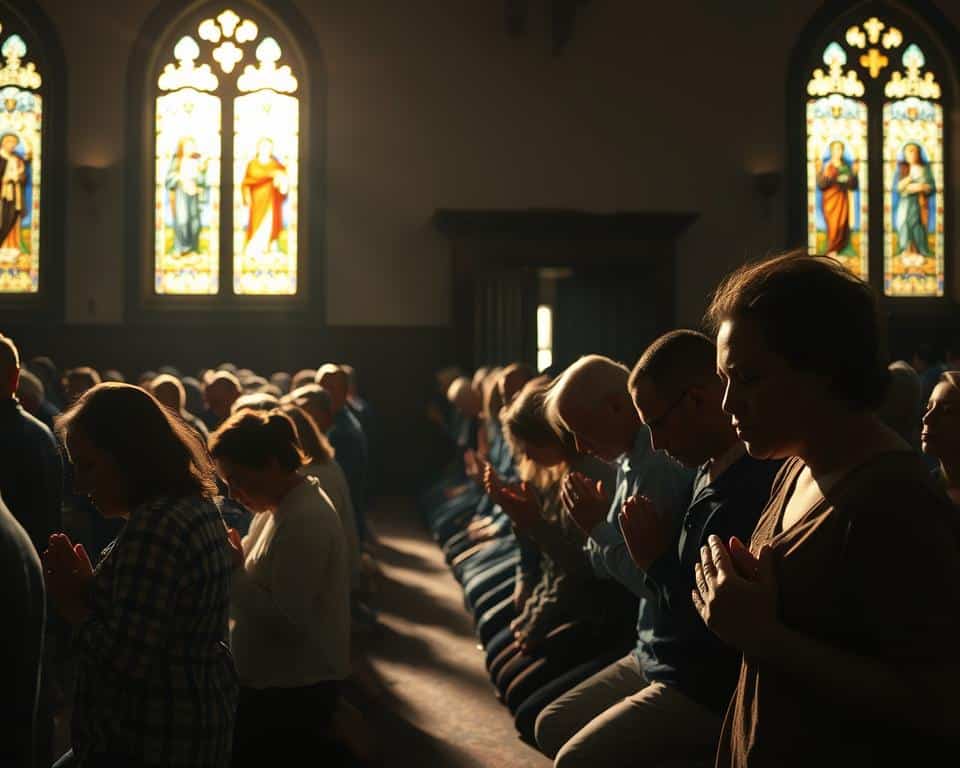“True worship is a matter of the heart, not the hands.” — A.W. Tozer. This powerful truth captures the essence of what Jesus taught the Samaritan woman in John 4:23. Worship isn’t about rituals or locations—it’s about heartfelt devotion to God.
When Jesus spoke of worshiping in spirit and truth, He revealed a deeper connection. The “spirit” refers to both your innermost being and the Holy Spirit’s guidance. It’s about loving God with all your heart, mind, and strength.
Biblical worship isn’t confined to Sunday services. It’s a daily practice—a response to God’s love and truth. The Holy Spirit helps you understand His nature, making worship genuine and alive.
This kind of worship transforms routines into sacred moments. Are you ready to experience it?
The Biblical Foundation of Worshipping in Spirit
Jesus’ conversation with the Samaritan woman reshaped worship forever. At Jacob’s well, He declared, “True worshipers worship the Father in spirit and truth” (John 4:23). This wasn’t just theology—it overturned centuries of tradition.
Jesus’ Teaching to the Samaritan Woman
The Samaritan woman asked about worship locations—Mount Gerizim or Jerusalem. Jesus’ reply stunned her:
“A time is coming when you will worship the Father neither on this mountain nor in Jerusalem”
(John 4:21).
He highlighted a shift from physical places to heartfelt devotion. Jewish-Samaritan tensions made this radical. Worship wasn’t about geography but sincerity.

Key Scriptures on Spirit-Led Worship
Philippians 3:3 reinforces this: “We worship by the Spirit of God”. No confidence in rituals—just God’s power. Old Testament feasts hinted at this. Passover and Pentecost weren’t just events; they pointed to heart transformation.
Other verses deepen the picture:
- Psalm 100:2 – “Serve the Lord with gladness.”
- Hebrews 10:25 – Gather, but with purpose.
Jesus’ words at the well still echo: The Father seeks those who worship Him authentically. Are you one?
Worshipping in Spirit: What It Truly Means
God desires more than rituals—He seeks genuine connection with His people. True worship isn’t measured by outward actions but by the heart behind them. Jesus’ critique of the Pharisees in Matthew 15:7-9 reveals this stark contrast: “These people honor me with their lips, but their hearts are far from me.”

Heartfelt Worship vs. Ritualistic Worship
David’s raw Psalms show worship as honest conversation with God. He cried, rejoiced, and questioned—no pretense. The Pharisees, however, turned prayer into a performance. Their rituals lacked love.
Proverbs 4:23 warns: “Guard your heart, for everything you do flows from it.” Your heart condition shapes worship. Rote prayers check boxes; vulnerable prayers build relationship.
The Connection Between Spirit and Truth
John Piper once said, “Truth without emotion produces dead orthodoxy. Emotion without truth produces empty frenzy.” Worship must balance both. The Holy Spirit guides us into truth (John 16:13), while igniting passion for God.
Modern examples abound: Reciting memorized prayers feels hollow. But whispering your fears to God? That’s true worship. As 1 Samuel 15:22 reminds, obedience surpasses sacrifice. God values your heart over your habits.
The Role of the Holy Spirit in Worship
The Holy Spirit breathes life into worship, making it more than a ritual. As Philippians 3:3 says, “We worship by the Spirit of God”. Without Him, our praise lacks power and connection to truth.
- Convictor – He reveals sin and draws us to repentance (John 16:8).
- Guide – He illuminates Scripture, helping us grasp God’s character (John 16:13).
- Empowerer – He fuels our praise, just as He inspired artists in Exodus 31.
When the Holy Spirit leads, worship overflows in unexpected ways. Prophecy, tongues, and discernment—like in 2 Kings 3:15—show His active presence. Even music becomes transformative. A hymn sung in truth can soften the hardest heart.
Some churches lean charismatic, others liturgical. But both styles must worship in Spirit-led unity. As Romans 8:26 reminds us, the Holy Spirit intercedes when words fail. He turns quiet moments, like Jesus’ prayers in Mark 1:35, into sacred encounters.
“Worship must be Spirit-empowered to honor God fully.”
Whether corporate or personal, let the Holy Spirit direct your praise. That’s when worship god becomes alive.
Practical Ways to Worship God in Spirit
Daily acts of devotion turn ordinary moments into sacred worship. Whether through prayer, music, or serving others, every action can reflect your love for God. Here’s how to weave worship into your life.
Through Prayer and Scripture
Start with the Lord’s Prayer as a framework. Praise first, then petitions. David’s Psalms show raw honesty—try journaling prayers alongside Scripture. God’s word fuels authentic worship.
Set aside the first 10% of your day (time) for God. This “reverse tithe” mirrors Deuteronomy 14:22’s principle. Even brief moments, like thanking God for coffee, count.
Through Music and Obedience
Curate a playlist of doctrinally rich hymns and songs. Music stirs joy and focus, as Paul and Silas showed in Acts 16:25. Sing spontaneously—tehillah praises—even in your car.
Obedience is worship. Use skills like carpentry for church repairs. A member once rebuilt pews, turning work into an offering. Small acts matter.
Through Daily Life and Service
Serve meals at shelters or mentor kids. Jesus linked love for Him with feeding His sheep (John 21:15–17). Community worship, like the Israelites’, fosters unity.
“When we serve the least, we worship the most.”
Confess sins quickly to stay aligned with God. Your life becomes a living psalm—joy in action.
Common Misconceptions About Spirit-Led Worship
Many confuse emotional highs with genuine worship. Churches like Bridgeway balance doctrine and experience, but some chase “goosebump moments” without biblical depth. True worship roots emotion in truth—not the other way around.
Emotion Without Truth
Modern worship songs sometimes prioritize catchy lyrics over gospel clarity. A song might feel uplifting yet distort God’s nature. Psalm 96:4 warns: “Great is the Lord and most worthy of praise.” Worship must reflect His light, not just our feelings.
I once left a concert-style service feeling empty. The music stirred emotions, but the message lacked truth. James 5:16 reminds us: Confess sin and pray for healing. Real worship confronts brokenness, not just euphoria.
Truth Without Engagement
Some churches avoid Psalms of lament, fearing discomfort. But David’s raw cries (Psalm 22:1) model honest worship. Academic leaders may dissect Scripture without applying it. Knowledge alone is cold; truth demands response.
- Danger: Treating worship like a lecture.
- Solution: Let Scripture ignite passion. Sing, serve, and confess.
“Worship is a heart aflame for God, fueled by His Word.”
Whether through hymns or service, let your way of worship honor Him fully. The gospel transforms rituals into relationship.
Living as a True Worshipper Every Day
Romans 12:1 calls us to offer our lives as living sacrifices—this is worship. From sunrise to sunset, every moment can reflect God’s glory. Start your day with a simple prayer: “Use me today.”
A farmer once told me, “Tending crops is my act of true worship.” Like him, see your work as sacred. Fold laundry with gratitude. Serve clients with integrity. Even breaks become holy when you whisper thanks.
Try “breath prayers”—one-line praises between tasks. Family meals? Share a verse. Digital fasts help too. Silence distractions to hear God’s voice.
Paul’s words in 1 Corinthians 10:31 remind us: Do everything for God’s honor. Whether planting seeds or typing emails, let your life shout His praise.
FAQ
What does it mean to worship God in spirit?
Worshiping in spirit means connecting with God from the heart, not just through outward actions. It’s about sincerity, faith, and letting the Holy Spirit guide your praise.
How did Jesus explain worship to the Samaritan woman?
Jesus told her true worshipers must worship the Father in spirit and truth (John 4:23-24). He emphasized that real worship goes beyond location or tradition—it’s about devotion from the heart.
What’s the difference between heartfelt and ritualistic worship?
Heartfelt worship comes from love and faith, while ritualistic worship is just going through motions. God desires genuine connection, not empty traditions.
How does the Holy Spirit help in worship?
The Holy Spirit leads us into truth, stirs our hearts toward God, and helps us pray and praise with meaning (Romans 8:26). He makes worship alive and personal.
Can music be part of worshiping in spirit?
Yes! Music that honors God and comes from a faithful heart can deepen worship. But it’s not just about singing—it’s about the devotion behind it.
Is emotional worship the same as worshiping in spirit?
Not always. Emotions can be part of worship, but true spirit-led worship is grounded in God’s truth, not just feelings. Balance matters.
How can I worship God daily, not just in church?
Live faithfully, pray often, serve others, and let God’s word guide you. True worship is a lifestyle, not just a Sunday activity.





